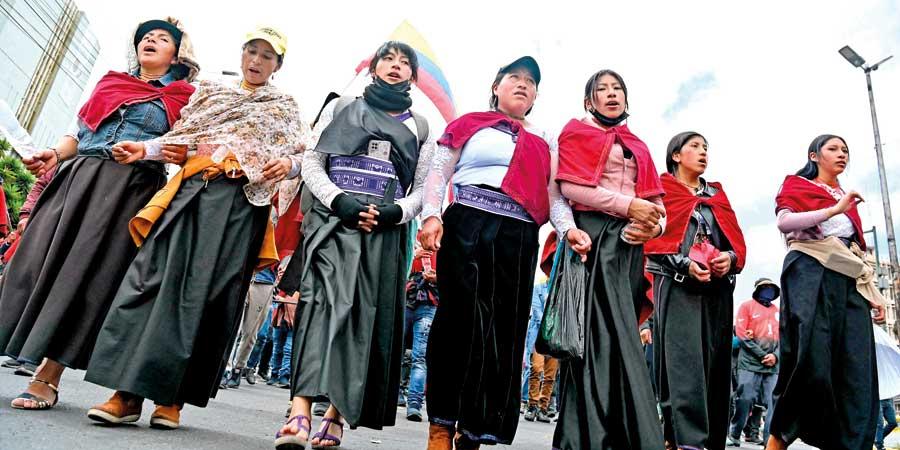01 Jul 2022 - {{hitsCtrl.values.hits}}

Indigenous people march toward the Carondelet Presidential Palace, in Quito, on June 27. AFP
In faraway Ecuador, a crisis similar to the one Sri Lanka is facing, is threatening to unseat a President.
Similarities of the crises in the two countries are striking in some aspects, while politics and geopolitics at play in the Latin American nation may also appear familiar to Sri Lankans and worth more than a mere mention here.
The Ecuadorians led by the indigenous communities have been continuing countrywide protests for the past several weeks, demanding that President Guillermo Lasso, just more than a year into his presidency, must go home if he cannot reduce the prices of fuel, agriculture products and divert more funds to education.
On Wednesday, Ecuador declared a state of emergency in some provinces as the protesters paralysed the country, calling on the president to resume talks with them to discuss their demands. The protests have seen four deaths, four disappearances and hundreds of arrests so far.
In scenes resembling Gotagogama protests outside the Presidential Secretariat in Colombo, the Ecuadorian protesters have camped outside their president’s office which remains barricaded by metal fencing and razor wire.
“We will stay here until the President of the Republic reinstates the dialogue. If we need to sleep here... we will,” AFP quoted a protest leader as telling the crowd.
The government said the emergency was declared to create a “security zone” around the country’s oil wells and protect food, medicine and fuel supplies, as well as oxygen in hospitals.
Agency reports said the protests triggered by the economic hardships linked to the coronavirus pandemic have been costly. The government says the country loses some $50 million a day and warns that oil production -- already halved -- could come to a complete halt soon.
The protests were spearheaded by the powerful Confederation of Indigenous Nationalities of Ecuador (Conaie), credited with unseating three presidents between 1997 and 2005.
Ecuador’s present government is seen as pro-United States, though it depends heavily on Chinese investments and loans.
If we go by the claim that newsiness of a happening gains in value depending on the geographic proximity, events in the South American nation on the Pacific coast hardly make any headlines in Sri Lanka, some 17,579 km away. But it should make news in Sri Lanka if we can relate to the crises in Ecuador, however far that country is.
However, in June 2012, Ecuador’s then socialist government made news in Sri Lanka, as it did in almost every country, when it braved the US and its all-weather poodle ally, the United Kingdom, to grant asylum to WikiLeaks chief Julian Assange at its embassy in London.
Ecuador’s socialist government’s courageous act was undone in 2019 by the then newly elected President Lenin Moreno. He improved relations with the US, revoked Assange’s asylum status and allowed the British police to drag him out of the embassy. Assange is now fighting what appears to be a losing legal battle in Britain to quash moves to extradite him to the US where he is facing sedition charges for fearlessly exercising the freedom of expression to bare the secret dealings and excesses of states, including the US.
It is an open secret in Ecuador that the US played a behind-the-scenes role in the political coup or the charade behind the election victory of Moreno, who got elected on a socialist platform only to betray the socialist causes. However, the national assembly is still dominated by the socialists, known as Correistas, as the supporters of former socialist president Rafael Correa are known.
Apart from the asylum offer to Assange, the US-Ecuador relations remained strained during the tenure of socialist president Corea. A series of developments widened the fissure. They included Ecuador’s declaration in 2008, that the country would officially default on billions of dollars of “illegitimate” foreign debt, mostly from US sources, the refusal to extend the contract to allow the US military to use the Manta air base on the Pacific coast for drug surveillance flights, the imposition of a staggering US$ 6.43 million fine on the US oil giant Chevron for polluting Amazon, and the expulsion of the US ambassador after WikiLeaks revealed a US hand in widespread corruption in the Ecuadorian police force.
Against the backdrop of these moves, seen by the US as hostile, pro-US analysts, especially those who give voice-cuts to US news channels, claim that the present protests against President Lasso were orchestrated by the socialist Correistas with a view to facilitating the return of 59-year-old Rafael Corea to power.
Today, both the US and China are scrambling to keep Ecuador under their respective orbit of influence.
The US is making every effort to keep President Lasso in power in the strategically important nation, rich in oil and natural resources and also a vital link in the battle against narcotics drugs.
China’s entry into the geopolitics of Ecuador was made easy, with Ecuador becoming a pariah state in international financial markets after President Corea in 2008 declared a default on foreign debts. Chinese investments and high-interest loans flowed in. The US described China’s loans and investments in Ecuador as predatory moves. Chinese oil giants PetroChina, Sinopec and the China National Petroleum Corporation offered a lifeline to Ecuador and gradually gained control of the oil industry and even mine fields in the protected Amazon rain forests.
Of Ecuador’s US$ 55 billion foreign debts, China accounts for more than 20 percent. In Sri Lanka’s case, Chinese loans account for 10 percent of the total debt burden of US$ 51 billion.
Critics say Ecuador has sold itself to China and does resemble a wholly-owned subsidiary of China. They say a controversial provision in an agreement between PetroChina, PetroEcuador, Ecuador’s Finance Ministry and the Chinese Development Bank allows China to seize Ecuador’s assets if the country fails to repay the loans and requires Ecuador “to irrevocably and unconditionally [waive] any right... to assert any immunity from or in any proceedings... against it or its assets.”
Ecuador, once again in a major debt trap, is seeking to restructure its loans with China. But in return, China is reported to have been pressing Ecuador to sign swap deals, including those involving resource-rich Amazon forest regions. In the meantime, the US, despite its flawed diplomacy to win over South America’s socialist-leaning people, has also agreed to rush in development aid to Ecuador to reduce the country’s dependence on China. But the US will be in a better position to tilt the scales in its favour only if it diverts the billions it spends on wars in Ukraine and other theatres to diplomacy aimed at
winning friends.
Certainly, there are many lessons for Sri Lanka in Ecuador’s crises and its relations with China and the US.
26 Dec 2024 20 minute ago
26 Dec 2024 2 hours ago
26 Dec 2024 3 hours ago
26 Dec 2024 5 hours ago
26 Dec 2024 6 hours ago